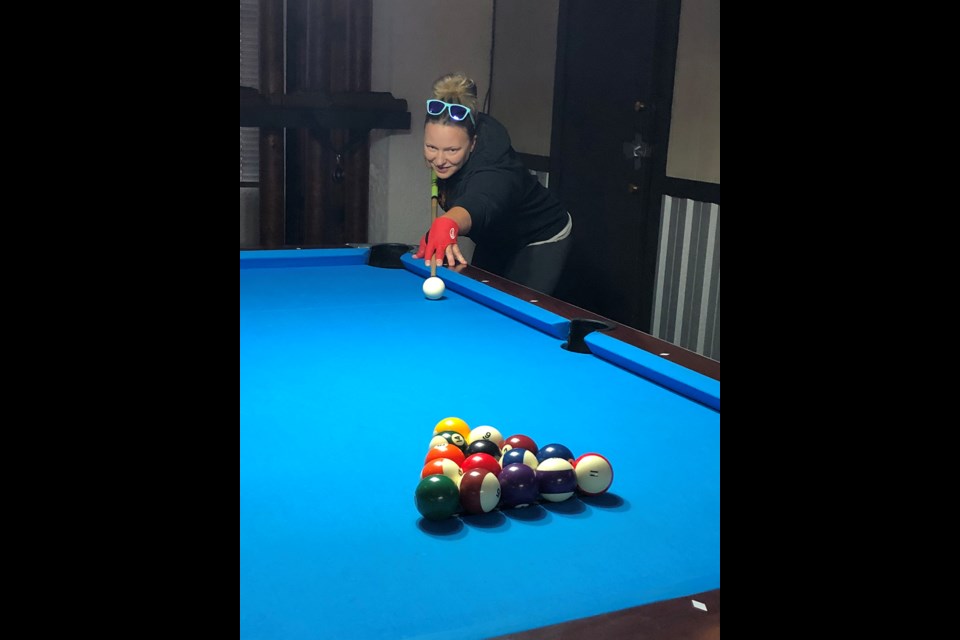I have lived in Powell River for nearly three years and only recently learned our community hosts a thriving local 8-ball league that began in 1995.
Not just one, but two established leagues currently play weekly; a Monday night league for those who play more like sharks, and a Wednesday night fun league. League president Chris Moore hopes to expand to include Tuesdays as an option for teams during the coming 28-week season that starts mid September.
I was intrigued by this qathet subculture despite being a novice pool player myself. I met up with Moore and a few players at the Cran Bar (Cranberry Pub) to watch them shoot pool and learn more about the Powell River 8-ball Pool League scene.
Tanya Charuk is relatively new to the pool scene and is coming into her third season with the league. She started out as a spare, which most new members will do unless they join at the same time as a team.
Charuk was a rank beginner two years ago and found the level of play quite intimidating at first, however, she said: “Both leagues are super friendly, super accommodating. They were super helpful with teaching me things.”
After only a few months of playing, Charuk was regularly recruited by teams who were down a player for the night – and her standings have improved from last place on the roster to the middle ranks.
“There is a lot of strategy to the game, which I have learned mostly over the last year,” said Charuk. “There is physics to the game, for instance, how I put a spin on the ball. It’s actually very fascinating.”
Moore agrees. He has played for more than 25 years, and despite being right handed, Moore has taught himself to shoot with either hand. He challenges himself to learn the subtleties of cause and effect, like how master chess players think many moves ahead of their current turn.
Playing options
Tournament play is a key part of the league culture and there are diverse competition options to choose from. Casual games held in private homes, monthly league-hosted tournaments in local venues and intercity tournaments on Vancouver Island. Some members travel to Vegas to watch or compete in huge tournament events.
Games are hosted in several local venues including the Cran Bar, Strikers (Westview Bowling & Billiards) and the Royal Canadian Legion. The pool tables are owned by Courtenay entrepreneur Rose Kantor, who leases tables to venues in qathet and on Vancouver Island. She also acquires, repairs and restores pool tables for clients.
Kantor has facilitated new leagues both here and on the Island. She notes a reciprocal relationship between venues and her leased tables, because players are also customers, customers who become a predictable and stable revenue source on game nights.
Additionally, local leagues host open round-robin tournaments on the last Sunday of each month (tables open at 11 am and the tournament begins at noon) and participants purchase food and beverages while they compete over the course of four to six hours, depending on the number of competing teams.
It is surprisingly inexpensive to get involved with the local leagues. New members pay $10 per week dues and a yearly $20 registration fee that includes membership for the entire year to Canadian Cue Sports (cdnqsport.com). CCS oversees all national billiard competitions across Canada and selects players to compete in international events.
I asked Moore and Charuk about the composition of local teams. Moore acknowledges most players are longtime Powell River residents but says the recent influx of folks moving in from other cities has enriched the league. He notes a couple who reached out to him via Facebook on the Powell River 8-ball League page before moving to Powell River from Calgary. They joined the league soon after arriving.
“It's super encouraging to see women playing,” said Charuk, estimating that female players are approaching the 25 per cent mark in local leagues.
There is a diverse age range, with most being described as age 40 and up. However, the club hopes to develop a youth program for 13- to 18-year-olds in the future.
Moore laughed and remarked that playing pool is a lot cheaper than spending time in an arcade, and there is far more fun to be had. One barrier to a youth league is the fact that most local tables are in licensed premises.
Moore explained sportsman-like behaviour is key to local game culture and pointed out that the players routinely shake hands at the end of each match.
Charuk values the emphasis on being intentionally welcoming to new players and even to those who prefer to watch from a distance and not play. She describes a man who spent months watching games before getting up from his table to converse and joke around with players. Not surprisingly, he was befriended and now plays on a league team.
Before concluding the interview, I was introduced to Chris Redman and Michel Samson, and sure enough, both men extended handshakes and encouraged me to stay for a while and watch their team play.
Anyone curious about playing pool locally can phone or text Chris Moore at 604.483.1976. All are welcome to join and will find plenty of support to develop as a player. A pool cue is not needed to get started.
It doesn’t matter if you regularly run out the table or if your trademark play is a scratch; you will fit right in.
Lana Cullis is a local writer and regular contributor to the Peak.
Join the Peak's email list for the top headlines right in your inbox Monday to Friday.




